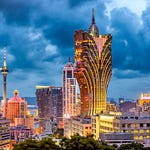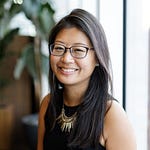I was sitting in the audience at San Francisco’s Moscone Center, the biggest conference venue in the city. It was 2017 and I was attending my fourth annual Facebook sales conference.
Mark Zuckerberg had just given us a rousing talk about the future of Facebook. Each year, ‘Uncle Zuck’ comes to our annual GMS (Global Marketing Solutions) conference to answer questions directly from Facebook’s global sales and marketing organisation.
That year, around five thousand people had flown into California from every single office—from Facebook Colombia to Facebook Ireland to Facebook Thailand.
Towards the end of his speech, it was time to open up for an audience Q&A. I got up from my seat and started making my way to the microphone. I was walking through a crowd of thousands, but felt completely alone.
Despite being a relatively seasoned Facebook veteran at that point, I still felt the lump in my throat and the heaviness in my legs as I mustered up the courage to ask Mark Zuckerberg a question.
I was 26 years old and filled with imposter syndrome. Despite having worked at Facebook for four years, it still felt like a dream and I always joked about having snuck through the application process.
I was the youngest person on Facebook’s Global Partnerships team and often thought I didn’t deserve to be there.
Step by step getting closer to the microphone, that voice in my head kept saying, “What the hell do you know? What kind of valuable question do you even think you’re capable of asking Mark Zuckerberg? You should turn around and sit back in your seat.”
I pushed those doubts away and finally got in line for the microphone. After hearing two other people ask their questions, it was finally my turn.

I felt like I was about to black out. The nerves turned into adrenaline and I finally managed to say it:
“Hi Zuck, my name is Anthony. I used to work in the New York office but am now on the Global Accounts team in London—”
Some people in the audience started cheering and whooping. I paused for a second, let out an awkward chuckle, and then continued.
“Considering that an increasingly large percentage of our user base is outside of America, don’t you think we should have more engineering offices outside the US. Shouldn’t Facebook be building more product teams in places like APAC (Asia-Pacific) in order to have better empathy for our global users?”
Zuck tilted his head to the left, looked away into the distance for a brief moment, and then replied,
“That’s a great question. I think it’s definitely true for the sake of our users that we need to make sure products are not only built in MPK [our California Headquarters]. And if a team is being stubborn about this, we will make sure to move them to get them out of that mindset. For example, I know a team that we moved to Seattle despite them wanting to be in MPK.”
I don’t know if he misunderstood my question, but I felt disappointed with his answer. I thanked him for the response, turned my back and started walking away from the microphone.
I felt frustrated that Zuck’s answer was a cop out. I felt that something was missing.
I remembered my friends at Facebook Dubai, who told me how overstretched they were covering clients literally across all of Middle East and North Africa.
I remembered my friends at Facebook Japan, who would have to be on team calls at 10PM because it was 9AM in New York.
I remembered my friends at Facebook Singapore, who cynically joked around at dinner saying how the biggest part of their job was fighting for attention from California.
I remembered colleagues from New York who were turning down job offers to transfer to a “remote” foreign office, fearing the move would harm their career progression by being even further from headquarters.
Facebook’s world-class executive leadership team consisted of Americans living on the West Coast. Clearly, they have succeeded beyond their wildest imagination and are very very good at their jobs.
But how much can they really develop a sense of empathy for someone in India or Brazil or Nigeria?
I’ve always had this nagging feeling that Silicon Valley is too culturally complacent and ignorant about what is happening around the world, especially in Asia.
Facebook started off as an app for American college students that was being built by American college students.
Now Facebook is a truly international platform, with the vast majority of its user base in emerging markets. Even Facebook’s marketing materials constantly emphasise stories about small business owners in places like Indonesia or India using the app.

Facebook builds products at the bleeding edge of technology, hires some of the world’s best people and fosters an incredibly progressive culture. But after working there for several years, I still felt that Facebook had a cultural blind spot around Asia.
So I thought…if even Facebook has an Asian blind spot, maybe other companies and other people do as well.
Twenty years ago, Silicon Valley honestly didn’t need to care about a place like India or China. In 2020, the most consequential issues for Silicon Valley companies usually come from places like India or China.
But what could I do about that..?
Two months ago, a friend reached out to me and said she really liked what I was writing in my other newsletter Venn Diagrams.
She asked me to write more about what’s happening in Asia, because she had no idea about the stuff going on there. I took note when she said that, because about a dozen other people had told me the same thing over the last six months.
I thought back to when Mark Zuckerberg answered my question in 2017, and I wished I could send him and all my friends some kind of overview explaining why I’m so excited about Asia.
Then it hit me…
Why don’t I translate my feverish rants about emerging markets, my obsessive reading about Asia, and my bold claims about underestimated companies…into an actual newsletter about Asian tech, media, and business?
And so this newsletter, East West Hurricane, was built out of the feelings that stirred when Mark Zuckerberg disappointed me three years ago and the realisations that crystallised when a friend asked me to write more about Asia two months ago.
Through creating this newsletter over the past 50 days, I’ve learned a lot about Asia. And I hope by reading East West Hurricane, you have also learned a lot.
Several people who have reached out to me giving positive feedback have been Asian-Americans.
They have told me how much they have learned and also even reconnected with a part of the world where they have ties. Whether or not you fit into that category, I hope this newsletter provides you with value.
I don’t know everything about Asian tech, but I am committed to this lifelong journey of learning.
I especially look forward to learning more from people like Andrew Baisley, whose career already resembles an East West Hurricane.
I have several more interviews planned for the weeks ahead from people whose careers in tech have swirled from East to West. Please let me know if you can think of other people who would be great to interview!

For about a million different reasons, it’s a scary time in the world right now.
To single one out specifically, I’m scared that people will hate and fear what they don’t know.
If we can highlight some of the cool, interesting things we can learn from Asia, and then make the world more international—in even just the smallest way—I would call this a success.
So please, share this post with a friend you think will benefit from learning more about Asian tech, media, and business.
Let’s share these stories that you and I have been reading. Let’s find others to go on this adventure with us together.















Share this post